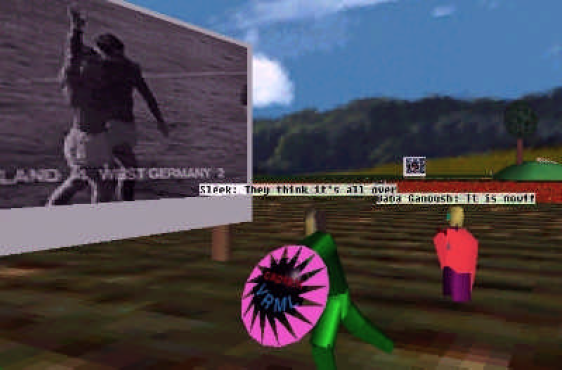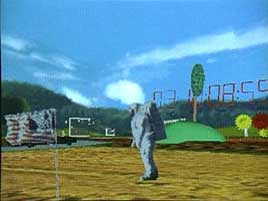The Net3, 1996-97
The third series of the first programme on British television to focus on the Internet, and have its own website. Series 3 included "The Mirror" which gave the public access to six virtual worlds on the Internet. Edited highlights of the action from the virtual worlds were broadcast on subsequent TV shows. The Mirror was a research collaboration between British Telecom, Illuminations, Sony and BBC Television.
The design of the six worlds of The Mirror reflected the content of the corresponding TV shows.
The six worlds were:
· Space – a lunar terrain, populated by responsive aliens, which focused on issues of navigation.
· Power – a hall of fame featuring animated figures from the past and present of computing. This led to a debating chamber with audience voting facilities.
· Play – filled with games and tricks, designed to promote co-operation and competition. Examples included a shuffleboard with persistent scores, a rocket that required three people to launch it and a bouncy castle.
· Identity – experimenting with notions of identity and the influence of the environment on people.
· Memory – a winding memory lane that passed through significant events from the last few decades. President Kennedy’s motorcade would appear. Elvis made fleeting appearances and a large clock displayed a count down to the ‘end of the world’. Figure 5 shows an example scene from Memory.
· Creation – a world of vibrant flora and fauna which included an art gallery where citizens could display their own VRML 2.0 creations.
These six worlds were linked by an entry portal that highlighted a ‘world of the week’, corresponding to that week’s broadcast TV programme. Various special events were also held within The Mirror, including: debates (e.g., between the science-fiction author Douglas Adams and Peter Cochrane, Head of Research at BT); a game show; an art exhibition; and the end of the world party.
The software used for The Mirror was Sony’s Community Place [Lea97] which supported text and graphical communication between inhabitants and performers. Over 2300 people registered to become citizens of The Mirror and received a CD-ROM containing the browser software and VRML2.0 content. Throughout the series, citizens spent 4500 hours logged on to the server.
Client: Illuminations Television for BBC2
Role: Researcher/developer for web site supporting BBC TV program HTML and VRML


